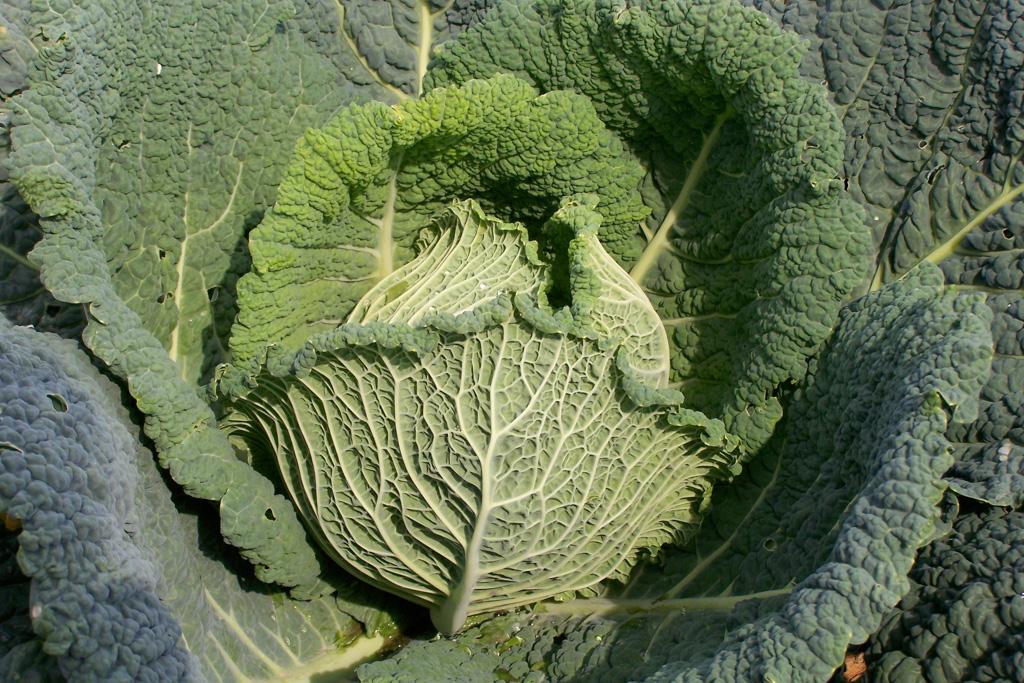A large feat in Vermont’s organic food system was underway throughout the first quarter of 2024. This spring, the food hubs in Vermont became certified organic! Why is this significant, what is a food hub, and why are they important to Vermont’s food landscape? Read on to learn more about a truly collaborative effort and why we are all celebrating this achievement.
“Are you looking to buy locally produced food wholesale or in bulk, but don’t have the time to manage relationships with dozens of farms and producers? When you buy through us, you get an amazing array of local products, all on one invoice!” explains Rutland’s Vermont Farmers Food Center on their website. This is a good summary of a food hub. They generally help small and medium-sized farmers and food entrepreneurs access larger markets by aggregating local food from various growers at their facilities. They purchase directly from farmers and producers to offer retail and wholesale buyers a wide array of local food through one access point. Others, like Farm Connex at the Center for an Agricultural Economy in Hardwick, provide temperature-controlled transport, aggregation services, and short-term storage options to over 80 local farms, processors, apiaries, and beverage companies. One of the larger food hubs in New England, Food Connects in Brattleboro, works with over 125 regional producers and distributes to over 280 wholesale customers in Vermont, New Hampshire, and Western Massachusetts. Some food hubs might lightly process or repackage products, but they all “handle” incoming and outgoing boxes, bags, jars, and pallets of food. These regional hubs provide critical infrastructure for both the producers and the customers (like restaurants, stores, and universities) – solving some transportation, aggregation, marketing, ordering, and fulfillment challenges that both sides otherwise face. They are an incredibly important part of our local & regional food supply chain!
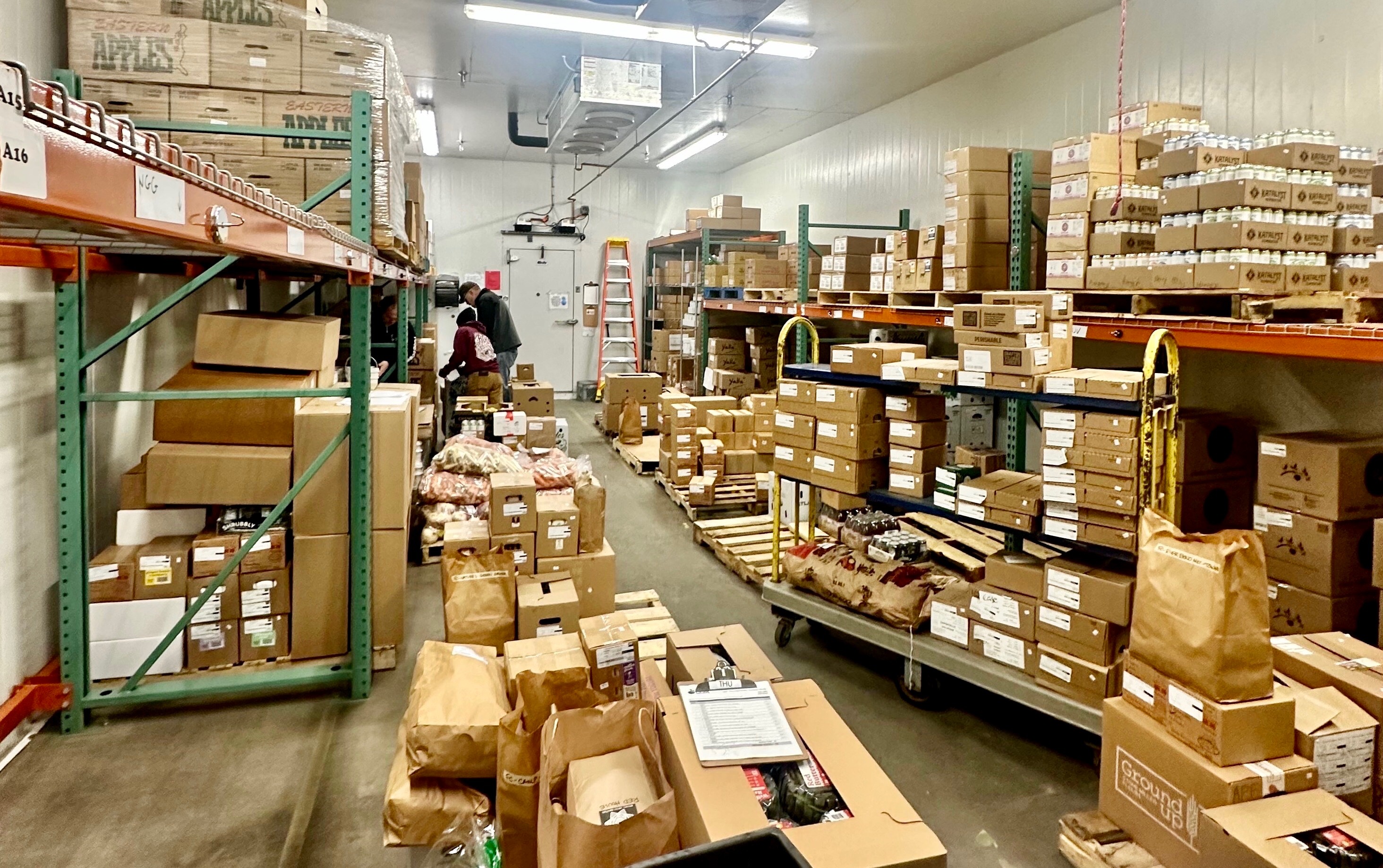
As a new organic regulation came online requiring food handlers to receive organic certification, NOFA-VT looked for ways to support the hubs in this transition. As such, seven Vermont food hubs are participating in a mentorship program through the Transition to Organic Partnership Program (TOPP) coordinated in Vermont by NOFA-VT. In alphabetical order and including where they are based, they are: ACORN Food Hub in Middlebury, Farm Connex in Hardwick, Food Connects in Brattleboro, Green Mountain Farm to School in Newport, Intervale Food Hub in Burlington, Myers Produce in Hardwick, and Vermont Farmers Food Center in Rutland. This learning cohort, supported by mentor Joe Dickson, came together in January and has provided support and community for all of the food hubs that worked to receive organic certification.

“The best part has been the sense of teamwork fostered within our mentorship cohort,” said Meggie Patton of Green Mountain Farm to School. “Joe has been really wonderful to work with, knowledgeable, calming (a super important quality throughout this process), and had me thinking, ‘I can do this!’,” says Tracy Weatherhogg, who oversees operations, facilities, and fulfillment at the Vermont Farmers Food Center.
As handlers of organic products, food hubs were not previously required to be certified organic, but as the new Strengthening Organic Enforcement rule went into effect in March of this year, some previously exempt entities had to pursue certification and meet all of the requirements. The National Organic Program (NOP) recently overhauled some of the organic standards too, with the goal of bolstering organic integrity and addressing potential fraud at several points in the supply chain – something for which organic advocates had been pushing for years. While we’re not as concerned about fraud here in Vermont (which is more common in larger, complex, and international organic operations), this new rule helps to preserve and promote consumer confidence in organic at every step, lending even more credibility to the organic label. Third-party certification ensures that organic integrity is maintained from sourcing seeds, growing practices, harvesting, washing, packing, storage, labeling, transport, and more – “trust the label from farm to table,” says inspector, Sarah Costin, putting the National Organic Program’s slogan into her own words. Food hubs are doing their part to ensure that contamination and commingling are not happening while they are handling organic products, which could be anything from the type of sanitizer or cleaning agent being used, residue from previous nonorganic products, mistaken labeling, or contact between organic and non-organic products.
At the same time that food hubs realized they’d need to become certified, the national Transition to Organic Partnership Program was launched in all regions of the country. This program is designed to support transitioning and organic producers with mentorship, technical assistance, and resources. This year, NOFA-VT has been coordinating the pairing of 20 mentees with experienced mentors across the state. Forming a cohort with the seven food hubs was a no-brainer, allowing them the benefit of going through the process together. Not without its challenges, Joe and others successfully ushered the group through the certification process in the span of three months to meet the March deadline.
The process felt frustrating to navigate at many points for many involved, but the fact that many folks were poised to help and figure it out together, made it a doable undertaking. The seven hubs vary in operational scale, size, employee numbers, physical space, and more, but many are already working with each other in terms of transportation and distribution, and many work with the same farms. The fundamental steps of the certification process were the same for all of them, so they learned from each other, shared standard operating procedures, and generally saved a lot of time and effort by working together as a group.
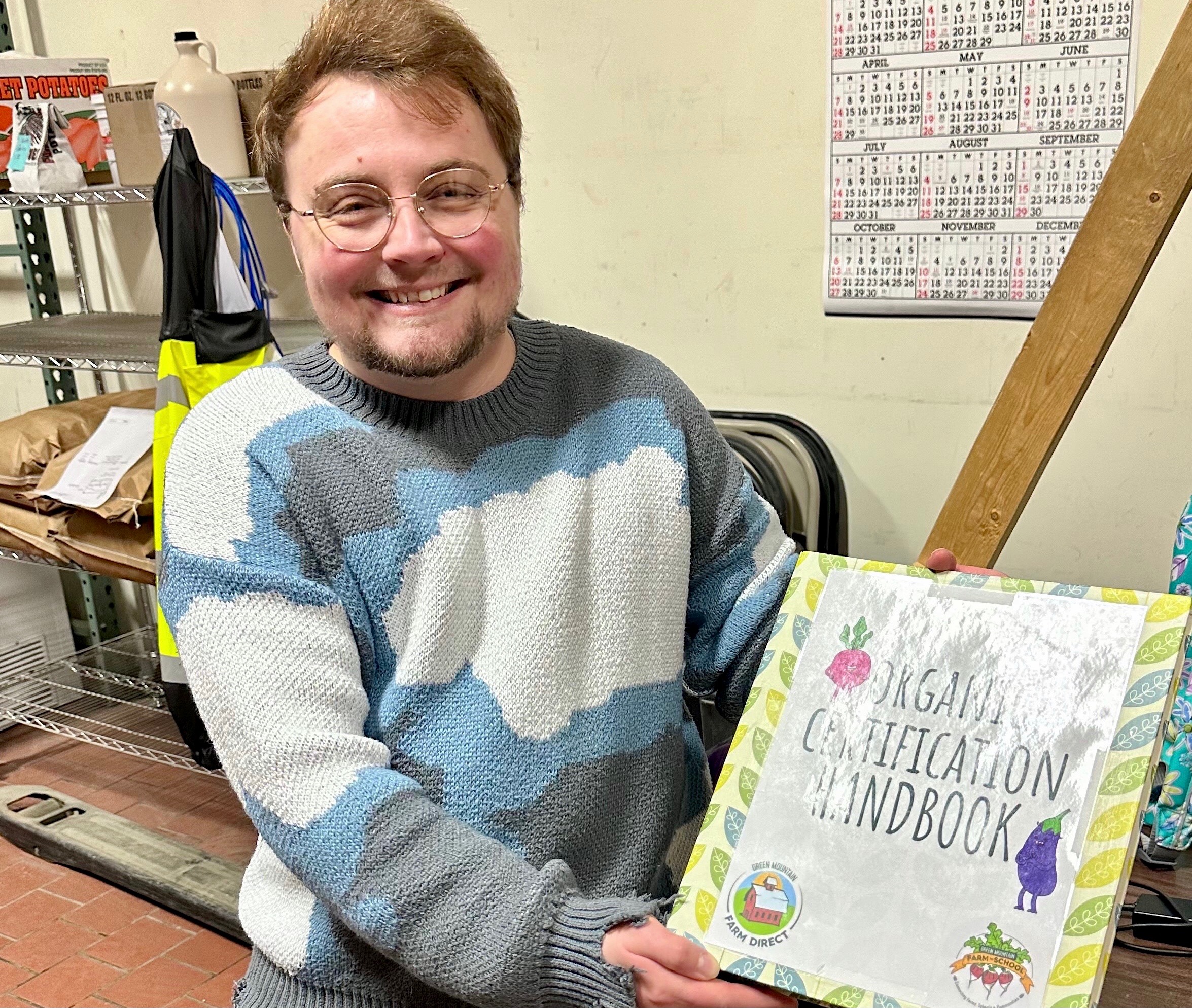
Joe first convened the cohort in January with a kickoff meeting where he shared that his goal was to help demystify the process, make it not feel scary, and be there every step of the way. He prepared slides to help put this in context, giving background on the history of organic. Prior to 1990, voluntary standards were created and managed collectively by organic farmers, with no single definition of the word “organic.” When the National Organic Standards were enacted, businesses like retailers, distributors, and brokers were exempt from pursuing certification. While some opted to obtain it regardless, to demonstrate the integrity of their sourcing and merchandising operations, it is now required for entities that receive, store, prepare for shipment, repack, relabel, combine, sort, etc. organic products.
Joe, who has his own consulting business, Lot 49 Advisors, has an accomplished background in the organic sector, making him well-suited to mentor in this capacity. A brief summary of his past roles includes working for Whole Foods for almost 20 years focusing on quality standards, which meant leading the growing company through organic certification of all their retail stores and warehouses, even though the retail chain was exempt. He became an expert in organic standards through that work, leading him to serve on the National Organic Standards Board for five years. He is currently serving on the Pennsylvania Certified Organic board. He and his husband also raised goats, chickens, and vegetables commercially for eight years.
For the cohort, Joe established a schedule for regular meetings, site visits, open office hours, communication channels for quick questions, and mock inspections. During his visits to each food hub, he walked the warehouse with the mentee to understand the physical plant, look for red flags, and provide technical and strategic support. To prepare for the inspection, he let them know the types of questions they’d receive. He attended some of the inspections as an observer and supported the hubs by debriefing afterward, going over the results, including any corrective action that needed to be taken.
“We’ve used a combination of one-on-one meetings, group meetings, and site visits for the mentorship project. I initially met one-on-one with each hub to share background and learn about their organizations. We held a series of six group Zoom meetings to cover basic concepts to prepare for certifications, including background and history on the NOP standard and SOE [Strengthening Organic Enforcement]; preparing an organic system plan; key issues in organic distributions (certificate management, storage and handling, sales and purchase data); what to expect from inspection, etc.,” Joe explained.
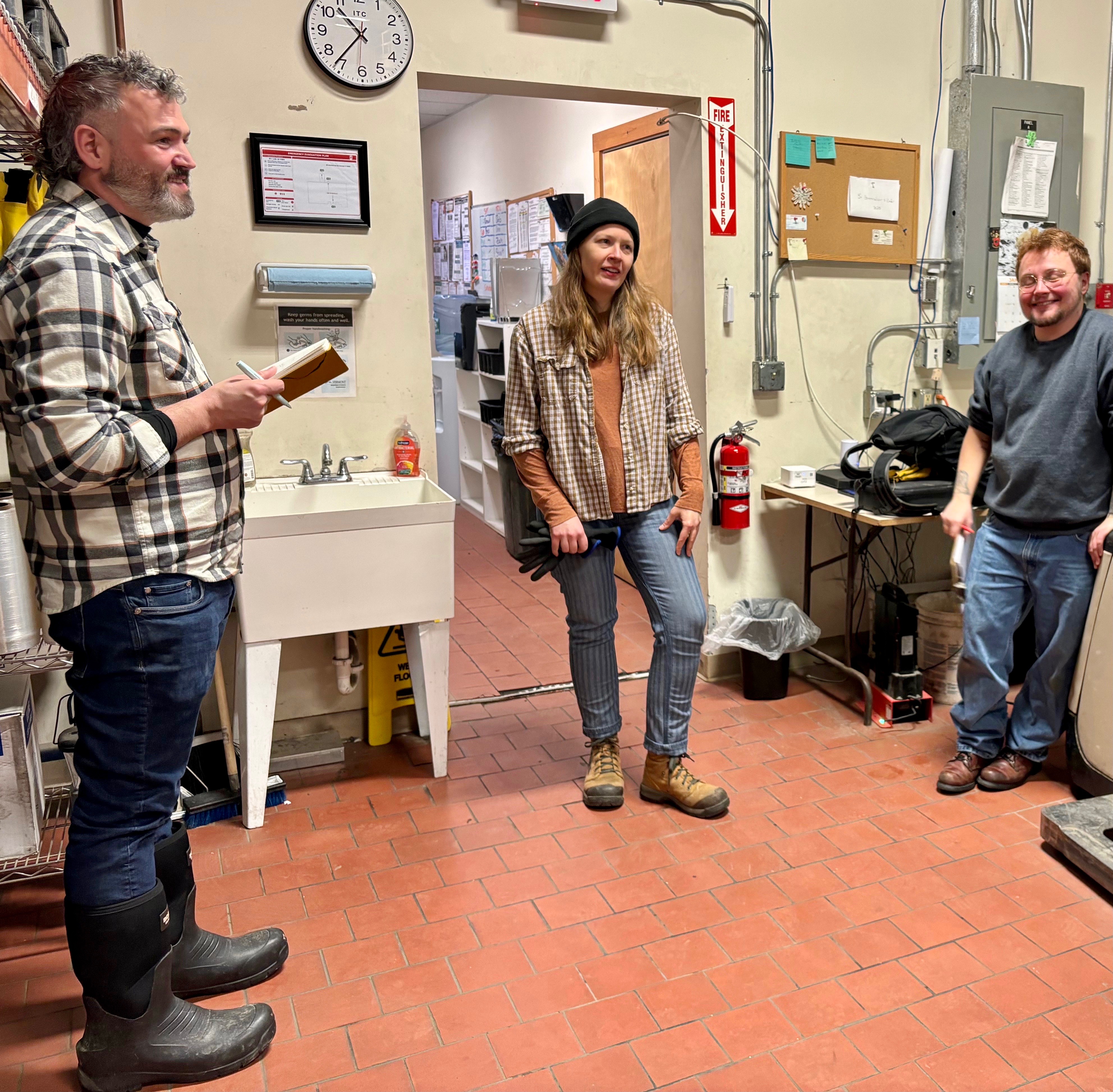
On the Vermont Organic Farmers (VOF) side, certification specialist Katie Birkhauser worked to support the food hubs’ certification process. Having been a farmer herself, she loves supporting farmers and operations that keep our local food system thriving. She shared that everyone learned a lot, even VOF as the certifier, as the timing between the NOP’s rule publication and the deadline for food hubs to comply didn’t give much lead time to adjust systems and forms to accommodate handlers (which includes food hubs). “The most challenging part was taking the brand new regulations, digesting and interpreting them, while simultaneously needing to be able to answer questions and guide our new handlers.” While the new regulations were published the year before, the work of interpreting and applying them was only starting to be understood a few months before the March 19th implementation date. For all certifiers, including VOF, it will likely take at least a couple of years for the rule interpretations, internal procedures, and documents to fully evolve. However, based on this year’s experience, Katie anticipates that it will be much smoother in 2025 with tailored forms for handler-only operations, etc.
Along with Joe, Katie was an invaluable partner in the certification success. She worked directly with the food hubs to understand their operations and assist them in understanding the application and requirements. She met with the mentorship group to answer questions and discuss specifics, reviewed their applications and supporting documentation, assigned inspectors, and worked with them to ensure the new regulations were clear. She then reviewed the inspection reports and ultimately issued certificates to all seven operations. Woohoo! Theo Holmes, Compliance Admin Manager at Farm Connex, shared that Katie was a saving angel because interpreting regulations is hard unless you are trained - she jumped in to help as an expert in the organic standards, looking through their documents to ensure they were on the right track.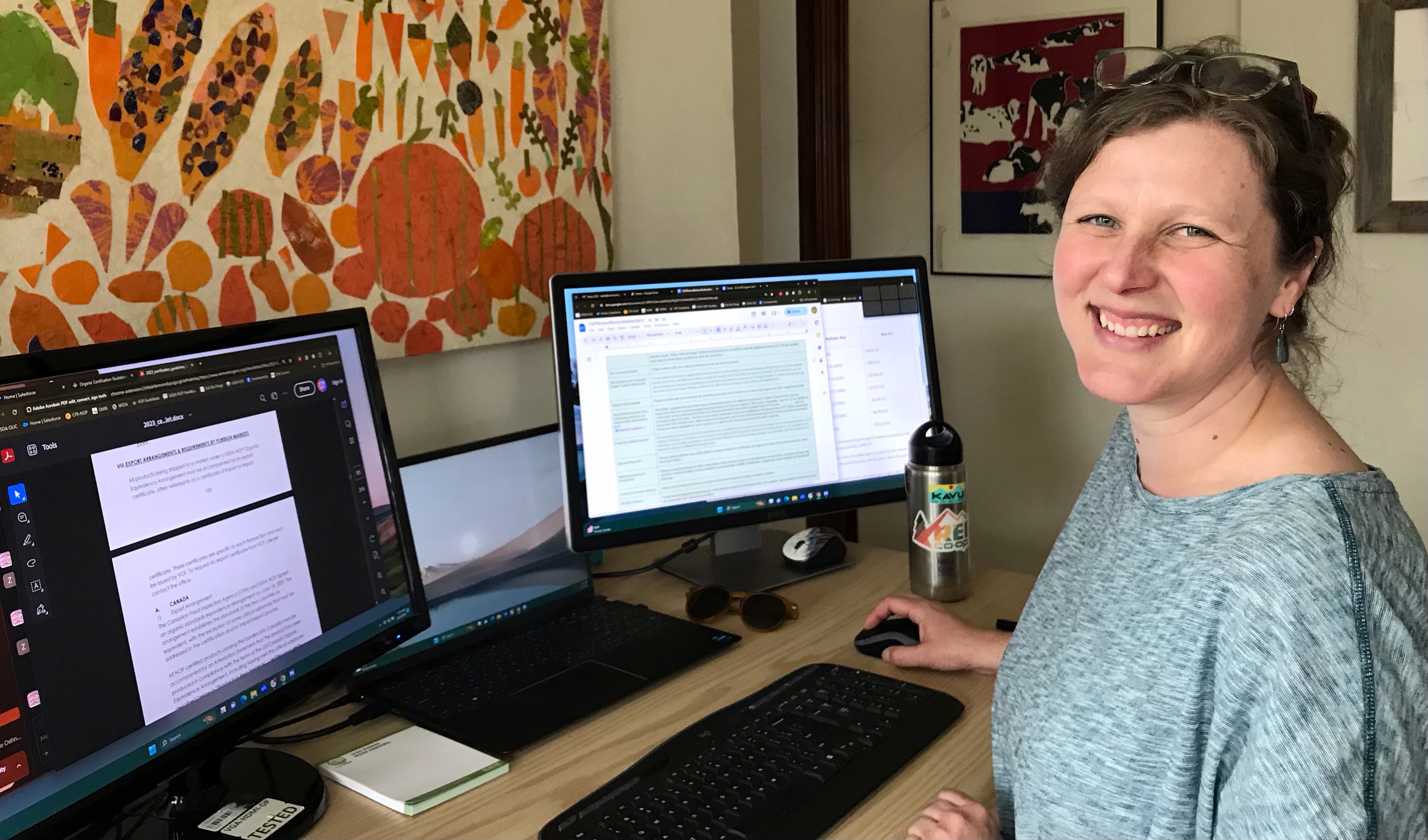
“I think it’s important that the food hubs are certified because certification offers consumers an additional degree of confidence that the organic products they handle have maintained their organic integrity through the supply chain. As a consumer, I know this is important to me,” says Katie, pictured here reviewing files in the VOF office.
The food hub mentees felt gratitude for the support they received. Some felt that there was no way they could have navigated the certification process on their own, even if they already had good systems in place or had previously worked in compliance. “The mentorship program was absolutely vital to our success with our certification,” says Meggie Patton from Green Mountain Farm to School. Theo, of Farm Connex, had assumptions about what organic is and what it entails. Theo shared that he learned so much in the last few months about what farmers and growers can and can’t do, and what Farm Connex needs to do to continue to take good care of the organic products that they receive. As part of the cohort, Theo made a good connection with fellow mentee, McKenna Hayes, who will be helping Theo with their driver policies and training. McKenna, who is the Food Hub Director at Food Connects, found the whole process engaging and exciting. With a background in food and agriculture law, she regularly provides compliance-related technical assistance to other food hubs and her cohort peers through the certification process, helping to translate technical regulations into food hub operations. She helped develop the cohort idea with Nicole Dehne, VOF Certification Director, and is encouraging other food hub networks throughout the country to replicate VOF’s successful model. While Food Connects had to refine some of its systems and policies to include organic-specific language, they already had a robust compliance program in place due to their larger size and work with large institutions. Thanks to the mentorship program, the Food Connects team was well prepared for the inspection.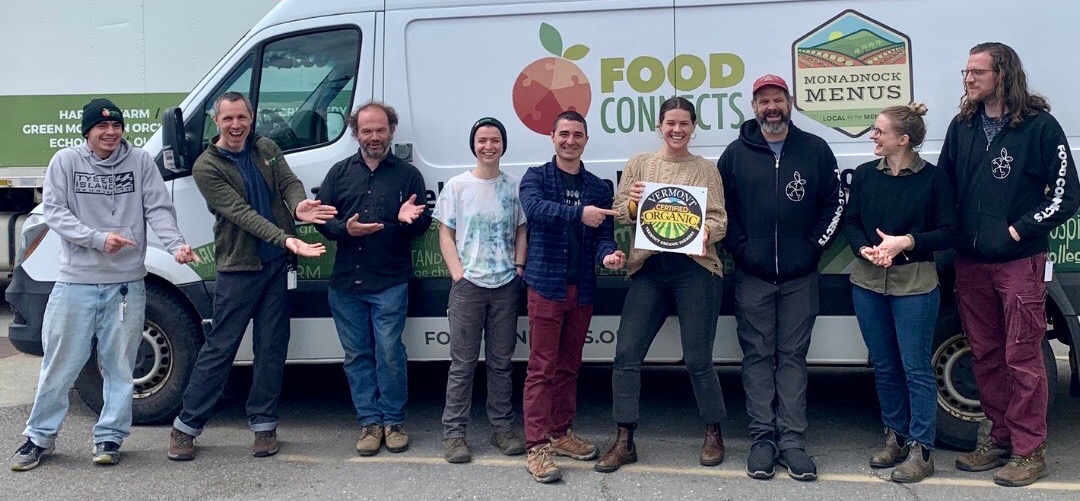
The inspection is the culmination of lots of detailed work and is conducted by an inspector contracted by VOF. Sarah Costin and Clotilde Hryshko were two of the inspectors, each assigned to several food hubs. Both have been doing this work for years, love meeting dedicated people, and were inspired to learn so much about each food hub. Sarah says that food hubs are her new favorite operation because of what they do and Clotilde shares the sentiment, saying how it’s such a big plus for growers of all sizes to access markets beyond their local venues (that are likely saturated), and how positive it is to see these hubs sprinkled across the state and moving a lot of product!
Many food hubs commented that their inspectors were wonderful and made them feel at ease. Sarah knows the regulations inside and out, having previously worked for Quality Assurance International Organic Certification, as a trainer for the organization that trains inspectors (IOIA), and started and ran her own certification agency for seven years before returning to Vermont in 2015 where she inspects for both VOF and Baystate Organic Certifiers. Clotilde has worked in this capacity for VOF for about 10 years, has been a small certified producer since 1991, was an adjunct professor teaching a soils course at (previously named) Vermont Technical College, and now enjoys the flexible, part-time work of inspecting.
An inspector’s role is to verify the application: observe and record, be thorough, professional, and supportive, gain an understanding of what the operation is doing, and relay what is required. Clotilde approached these inspections by establishing a history with the hub, understanding their business and goals, and the records they use and need. She looked at all of the growers that the hub is buying from and explained that she might catch something that was an innocent oversight, helping to improve the hub’s systems, and reinforcing that we’re all partners in this process.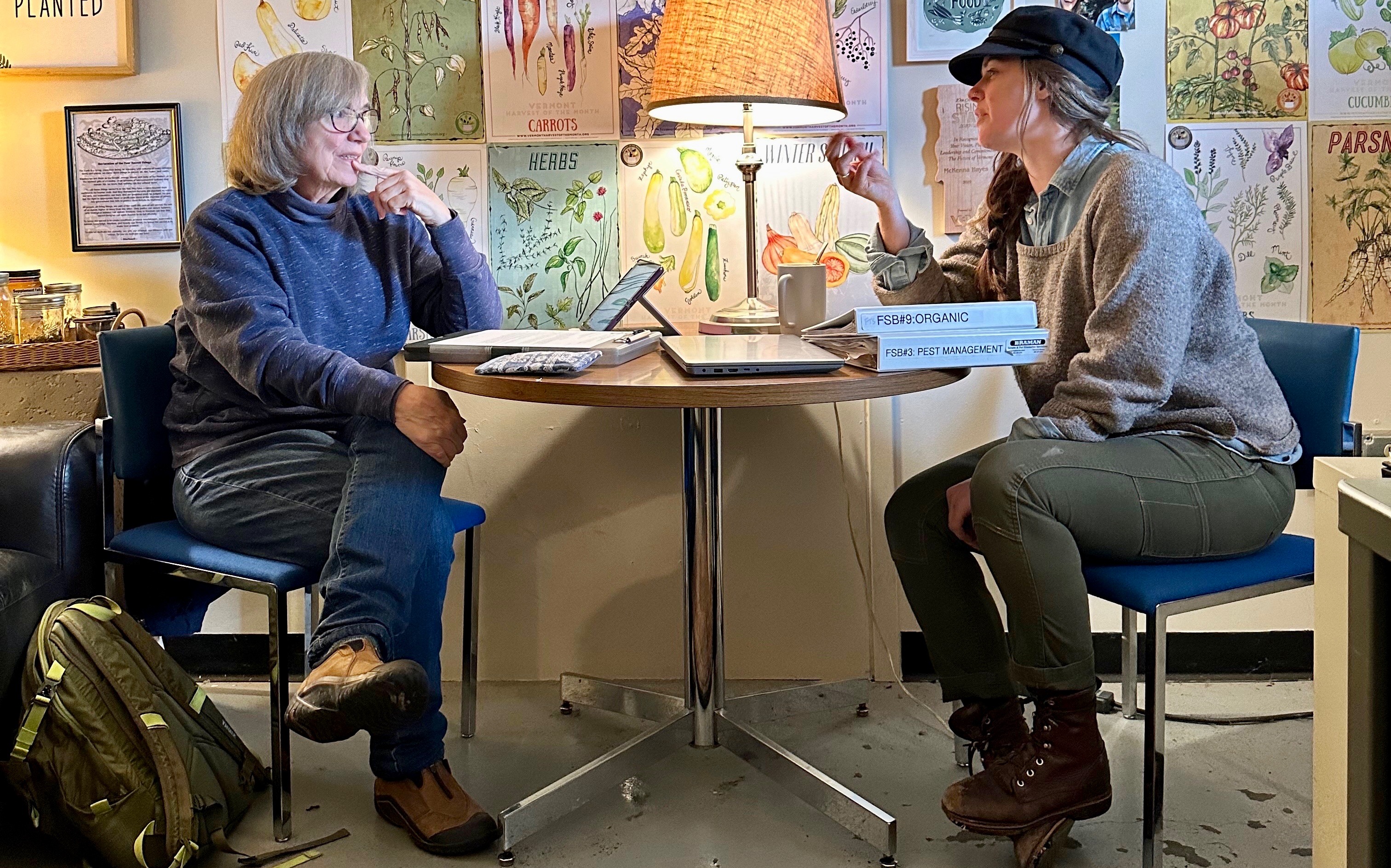
When asked why or if they feel it’s important that our state’s food hubs achieve certification, Sarah said, “This certification removes some of the gray areas of “how do you know it’s organic” - if employees weren’t trained in organic, they could be contaminating and not know it.” She explains that the integrity of producers in Vermont is incredibly high and their commitment to organic is strong, but this new enforcement is a good thing nationally, as she did see fraud in some of her previous jobs on the West Coast, where very large operations occasionally took advantage. Clotilde sees the value in a larger context too, as a mirror in the system and extra eyes and ears. These were her first inspections in 2024 with the new rules and she wanted to make sure folks understood what was behind the new regulations. She didn’t want it to seem overly bureaucratic; wanting it to make sense, she explained the bigger picture and the fraud within the organic industry, giving examples of fraud in the general system so that folks understand that this is a start to address it. “I try to explain it in a positive way, that it’s about enforcing standards and integrity, not just another requirement to make people’s lives a nightmare.”
To give a snapshot (as of spring 2024) of the numerical impact that the certification of the food hubs signifies, 71 VOF-certified farms supply all seven hubs, which represents 6,397 total organic acres in Vermont. The many individuals who made this achievement possible should be very proud! Joe offered the following as a thoughtful summary: “It’s been a joy to share my experience with the group and set up group discussions to facilitate the hubs sharing best practices and ideas with each other. I’ve learned at least as much as I’ve shared, and been deeply inspired by the work each of these organizations is doing to build a resilient regional food system in Vermont.”

